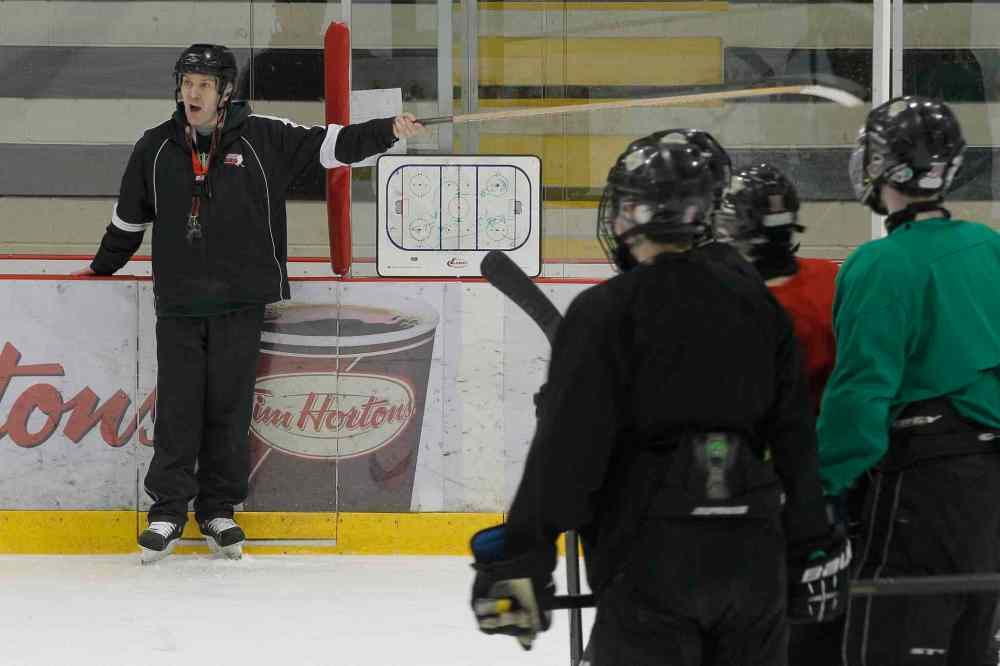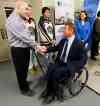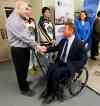Spinal-cord injury not end of world
More cash to support programs for those injured
Advertisement
Read this article for free:
or
Already have an account? Log in here »
To continue reading, please subscribe:
Monthly Digital Subscription
$0 for the first 4 weeks*
- Enjoy unlimited reading on winnipegfreepress.com
- Read the E-Edition, our digital replica newspaper
- Access News Break, our award-winning app
- Play interactive puzzles
*No charge for 4 weeks then price increases to the regular rate of $19.00 plus GST every four weeks. Offer available to new and qualified returning subscribers only. Cancel any time.
Monthly Digital Subscription
$4.75/week*
- Enjoy unlimited reading on winnipegfreepress.com
- Read the E-Edition, our digital replica newspaper
- Access News Break, our award-winning app
- Play interactive puzzles
*Billed as $19 plus GST every four weeks. Cancel any time.
To continue reading, please subscribe:
Add Free Press access to your Brandon Sun subscription for only an additional
$1 for the first 4 weeks*
*Your next subscription payment will increase by $1.00 and you will be charged $16.99 plus GST for four weeks. After four weeks, your payment will increase to $23.99 plus GST every four weeks.
Read unlimited articles for free today:
or
Already have an account? Log in here »
Hey there, time traveller!
This article was published 04/03/2014 (4274 days ago), so information in it may no longer be current.
Scott Coates was 17 years old when he dove off a dock head first into what turned out to be a shallow pool and broke his neck.
Coates, who had been out earlier at a ball tournament in southwestern Manitoba with friends, was taken to hospital in Souris and immediately transferred to Health Sciences Centre, where his neck was immobilized. He was paralysed from the chest down.
An emergency room physician told him something he would never forget. “The first comment out of his mouth was, ‘You’ll never walk again,’ ” Coates said Monday.

That was in July 1992.
Turns out the emergency doctor’s assessment was premature. Now, 39, Coates is a public servant and a hockey coach. He is able to walk with the aid of only a cane.
“I still have some (mobility) deficits today, but compared with the alternative, I’ll take it any day,” he said of his present condition.
This morning, new funding will be announced to support people such as Coates, who have suffered spinal-cord injuries. The announcement will be made by the Selinger government and Canadian Paralympian and philanthropist Rick Hansen, famous for his Man in Motion World Tour. It would replace a five-year, $3-million deal announced in 2008, part of which went to support programs offered by the Manitoba branch of the Canadian Paraplegic Association (CPA).
Coates spent seven months in hospital, undergoing rehab. Slowly, he regained movement in his limbs. “I started out in a wheelchair and then I gradually progressed to a standup walker. I was (then) able to use arm crutches. And I left with one cane.”
His condition kept progressing and stabilized within a year of his being discharged.
Coates is no stranger to adversity. Both his parents died by the time he was 16, leaving just Coates and a sister four years his senior.
He credits the paraplegic association for providing him the supports he needed to finish his high school education and enter Brandon University. He has taught elementary school in northern Saskatchewan as well as in Brandon and coached hockey at the Manitoba Junior League level.
He’s also earned master’s degrees in counselling and special education and worked as a vocational counsellor at the CPA in Winnipeg.
Ron Burky, CPA Manitoba’s executive director, said the organization provides rehab counselling, links with peer supports and vocational and employment services to those with spinal cord injuries.
“It’s incredible what advances have happened in technology and how people can adapt,” said Burky, whose organization is expected to receive new funding today. “Sometimes if they don’t go back to the exact same job, they might be able to go back to something very close to it.”
It’s estimated 3,000 Manitobans live with spinal cord injuries, with 60 new injuries per year.
CPA counsellors begin meeting with injured persons when they’re still in hospital. The association also provides information and supports for family members and employers.
Some patients feel when they become injured they will never work again, Burky said. But that’s often not the case.
“There is an incredible number of Manitobans who are doing things people would not believe,” he said. “We have farmers who are farming. They have high-level injuries but they’ve been able to modify their tractors.”
larry.kusch@freepress.mb.ca



